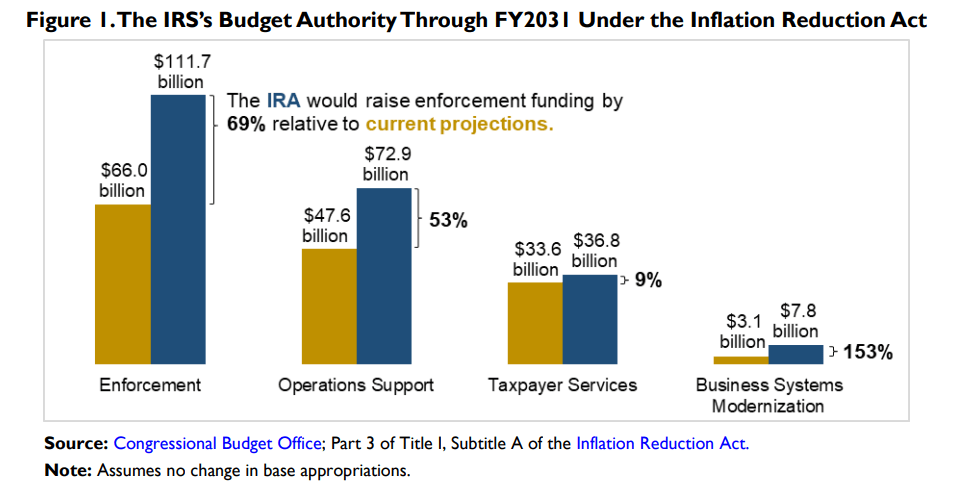Tax Byte
Senate Approves Inflation Reduction Act with Significant Tax Law Changes, IRS Funding Boost
If you weren’t tuned into the 15 hours of Senate floor proceedings known as “vote-a-rama” over the weekend (good for you), you may have missed that the upper chamber on August 7 approved along party lines the Inflation Reduction Act (IRA) of 2022 (HR 5376). The sweeping climate and healthcare bill contains significant tax law changes and a steep IRS funding boost.
Although the IRA (that acronym will likely always feel weird, am I right?) contains several provisions originally seen in the much larger House-passed Build Back Better Act, I suppose Sharon Kreider’s suggested title revision to Congress of Build Back Barely Better didn’t have quite the same ring to it. Tough but fair.
The original draft of the IRA bill was released at the end of July but underwent some cuts and amendments before making it over the finish line. The measure now heads to the House. President Biden has said he intends to sign the legislation once it reaches his desk.
Let’s take just a bite of some of the notable tax changes.
See what I did there?
IRA Tax Provisions
Generally, if enacted the IRA (still weird) would:
- Establish a 15% corporate alternative minimum tax (AMT), also known as a “book tax” on certain large corporations (effective for tax years beginning after December 31, 2022);
- Establish a 1% excise tax on stock buybacks (effective for repurchases of stock after December 31, 2022);
- Extend by two years the section 461(l) loss limitation rules for noncorporate taxpayers (extended to tax years beginning before January 1, 2029).
- Establish an excise tax on drug manufacturers, producers, and importers who fail to enter into drug pricing agreements;
- Extend the health insurance premium tax credit modifications made in the American Rescue Plan Act of 2021 (P.L. 117-2) through 2025;
- Extend and modify the credit for electricity produced from certain renewable resources;
- Modify the tax credit for plug-in electric vehicles, allowing certain clean vehicles to qualify and eliminating the current per manufacturer limit. The credit would be renamed the clean vehicle credit;
- Extend and modify the energy efficient new home credit; and
- Extend excise tax credits for alternative fuels, biodiesel, and renewable diesel.
As expected, modifying the tax treatment of carried interest as originally proposed in the bill was removed in the eleventh hour per rebellion from Sen. Kyrsten Sinema, D-Ariz.
Corporate AMT
Notably, Sinema, along with Sen. John Thune, R-S.D., successfully pushed for exempting portfolio companies of investment funds from the 15% AMT. As the bill was originally drafted, small and medium-sized businesses that are owned by private equity firms could have been exposed to the tax. Thune and Sinema drafted an amendment, which was adopted by a 57-43 vote, to clarify that profits from subsidiaries would not be considered in determining whether a firm is subject to the new AMT.
Additionally, the IRA’s legislative text was changed to exempt depreciation deductions under section 167 for property to which section 168 applies. Further, the updated text includes a new carveout for section 197 deductions for wireless spectrum acquired by telecommunications companies after December 31, 2007, and before the IRA’s enactment.
The American Institute of CPAs (AICPA) sent an August 4 letter to Congress stating that the new corporate AMT would violate numerous elements of good tax policy. In addition to adding complexity to the tax code, imposing tax according to financial statement income takes the definition of taxable income out of Congress’s hands and transfers it to those of industry regulators and others, the AICPA said. “There are many key conceptual differences between financial income and taxable income, including the concept of materiality. Public policy taxation goals should not have a role in influencing accounting standards or the resulting financial reporting.”
IRS Funding Boost
Under the IRA, the IRS will receive a nearly $80 billion boost in funding over a 10-year period. More than half of that funding is allocated for enforcement. The breakdown is as follows:
- $45,637,400,000 for enforcement,
- $3,181,500,000 for taxpayer services,
- $25,326,400,000 for operations support, and
- $4,750,700,000 for business systems modernization.
IRS Commissioner Charles “Chuck” Rettig in an August 4 letter thanked Congress for the significant increase in funding and assured lawmakers that the IRS’s intent was not to increase examinations on small businesses and middle-income taxpayers.
“These resources are absolutely not about increasing audit scrutiny on small businesses or middle-income Americans,” Rettig wrote. “As we’ve been planning, our investment of these enforcement resources is designed around the Department of the Treasury’s directive that audit rates will not rise relative to recent years for households making under $400,000.”
The letter, however, did not mention anything about an upgrade in hold music for the tax pros; I checked.

To view the full Congressional Research Service (CRS) Insight, click here.

STAY TUNED
Stay tuned for additional IRA insights when Jessica takes a deep dive into the legislation with our eTax Alert follow-up.
